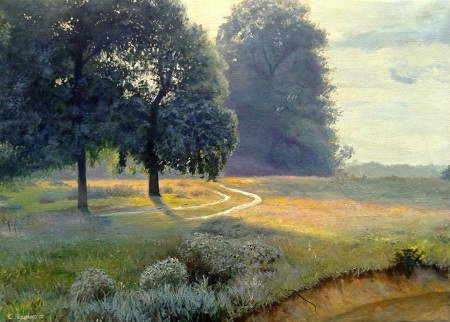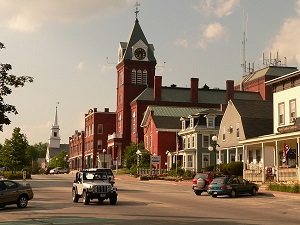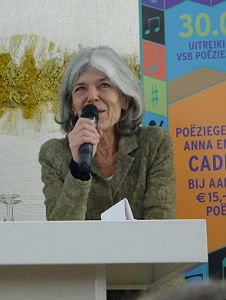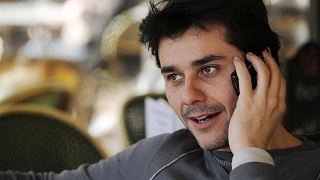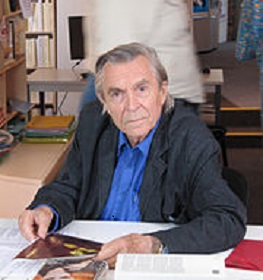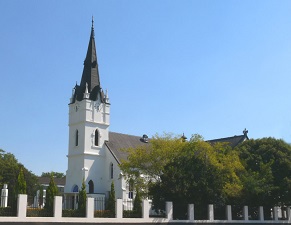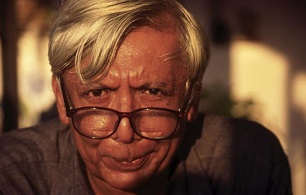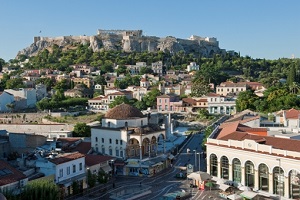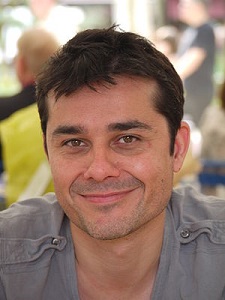Dolce far niente – Bij de Nijmeegse Vierdaagse
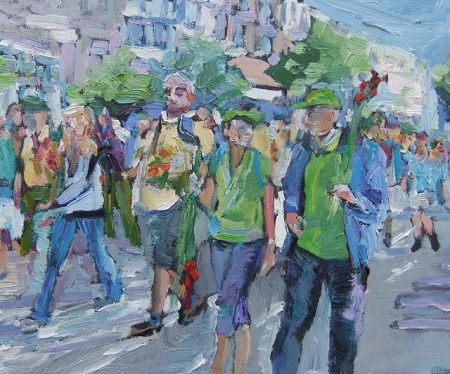
Geen gedicht
Ik wilde de vierdaagse vangen
het wandelen grijpen in een vers
De ziel beschrijven van de feesten
zonder de woorden bier en blaren
te gebruiken, dat ik kon schrijven
van de mensen, al de dagen en het ritme
van de tocht, zonder herrie of gedruis
dat wat zou blijven, de ervaring
van die tocht naar alle windstreken
en het bewegen door de straten
als het stromen van de Waal
ik kreeg blaren op mijn vingers
door het schrappen en het strepen
vond geen woorden voor de mars,
noch voor het zingen langs de lanen
of het verkoeveren in de luwte van de brug
de zon looide mijn lege hoofd
bier verkoelde mijn ingewanden
de feesten masseerden mijn gemoed
na vier dagen legde ik mijn pen neer
en kocht voor mijzelf een gladiool
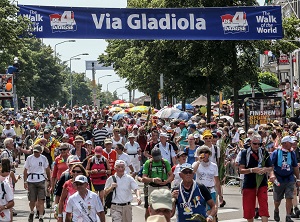
De intocht van de Vierdaagse in Nijmegen
De Nederlandse dichteres en schrijfster Anna Enquist werd geboren op 19 juli 1945 in Amsterdam als Christa Boer. Zie ook alle tags voor Anna Enquist op dit blog.
Uit: Want de avond
“Niets
blijft hetzelfde, denkt Jochem terwijl hij langzaam om zijn as draait
en zijn blik over het nieuwe atelier laat gaan. Alles verandert, hoe je
je ook inspant om de oude situatie in stand te houden. Ik heb ramen, al
verberg ik ze achter de elegante lamellen van de modieuze zonwering,
zodat ik me in het half ondergrondse hok kan wanen waar ik me thuis
voelde. Ik heb witgesausde muren, onbekraste planken, roestvrijstalen
werkbladen en keurige kasten met schuifdeuren. Daar vecht ik tegen,
gewapend met de troep die ik heb meegenomen: bemorste lijmpannen met
aangekoekte strepen, beitels met versleten handgrepen, stokoude mallen
en vieze lappen. Om het nieuwe teniet te doen leg ik het oude overal
neer. Maar hetzelfde is het niet. De zoldering is hoger, de tl-buizen
zijn feller. Boven de werkbank hangt een beweegbare operatielamp. In de
lade, die nog net zo moeizaam opengaat als vroeger, liggen de
tandartsspiegeltjes en de haken om de f-gaten mee binnen te komen tussen
smerige penselen en brokjes hars.
Het atelier heeft een L-vorm en
aan het einde van de korte poot lijkt het wel een huisje. Een aanrecht
met elektrische plaatjes en een koffiemachine, wc en douche achter een
ondoorzichtige glazen wand. Een bank waarop je zou kunnen slapen, een
keukentafel met gebruikte kopjes en een suikerpot. Het huiselijke
gedeelte is van het atelier gescheiden door een hoge kast. Aan de
keukenkant is die volgestouwd met vaatwerk, opgevouwen handdoeken en
kleding. Aan de werkzijde zijn de planken gevuld met glazen potten om
lak in te bewaren, met tijdschriften over vioolbouw in verschillende
talen en met dozen vol noodzakelijke prullen en spullen: sourdines,
kammen, snaren, stemknoppen, schoudersteunen. Het ziet er al lekker vol
uit, ziet hij met tevredenheid.
Hij knipt de operatielamp aan en
kijkt naar een viool die in een wiegje van schuimrubber op de werkbank
ligt. Wat is er met je, mag ik even naar je kijken? Hij is een
vriendelijke kinderarts. Niet bang zijn, het doet geen pijn en het licht
is alleen maar fel om beter te kunnen zien. Voorzichtig tokkelt hij met
zijn duim de snaren aan, een voor een. Goed zo. Op de ene schouder van
het instrument is de lak weggesleten. De kam staat niet goed recht en
ziet eruit of hij zomaar kan omklappen.”

De Franse schrijver Laurent Binet werd geboren in Parijs op 19 juli 1972. Zie ook alle tags voor Laurent Binet op dit blog.
Uit:De zevende functie van taal (Vertaald door Liesbeth van Nes)
“In
de Flore zien ze een blond vrouwtje naast een man zitten die loenst
achter dikke brillenglazen en nogal ziekelijk oogt, zijn kikkerhoofd
zegt Bayard wel iets, maar voor hem zijn ze niet gekomen. Bayard ontdekt
mannen van onder de dertig en spreekt hen aan. Het zijn voor het
grootste deel gigolo’s die hier iemand proberen op te pikken. Kenden ze
Barthes? Allemaal. Bayard ondervraagt hen een voor een terwijl Simon
Herzog Sartre vanuit zijn ooghoeken in de gaten houdt: hij ziet er
helemaal niet gezond uit en blijft maar hoesten, terwijl hij trekjes van
zijn sigaret neemt. Françoise Sagan klopt hem bezorgd op zijn rug. Een
jonge Marokkaan is de laatste die Barthes heeft gezien, op het moment
dat de grote criticus in onderhandeling was met een nieuweling, zijn
naam kent hij niet, maar ze zijn met zijn tweeën vertrokken, hij weet
niet wat ze hebben gedaan, waar ze naartoe zijn gegaan of waar hij
woont, maar waar hij die avond te vinden is weet hij wel: in Bains
Diderot, een sauna bij het Gare de Lyon. ‘Een sauna?’ zegt Simon Herzog
verbaasd, als er een fanaticus met een sjaal binnenkomt en tegen niemand
in het bijzonder begint te roepen: ‘Kijk nou toch eens naar die koppen!
Die hebben niet lang meer te gaan! Luister goed, een burger moet
regeren of sterven, en zo is het! Drink! Drink uw Fernet op de
gezondheid van uw maatschappij! Profiteer, profiteer! Verjaag! Takel af!
Leve Bokassa!’ Een paar gesprekken vallen stil, de stamgasten bekijken
de nieuwkomer met een droefgeestige blik, de toeristen proberen te
genieten van de attractie zonder goed te begrijpen wat die precies
inhoudt, maar de obers blijven drankjes serveren alsof er niets aan de
hand is. Overdreven theatraal met zijn arm zwaaiend richt de profeet met
de sjaal zich tot een imaginaire persoon en roept zegevierend uit: ‘Het
is niet de moeite om te rennen, kameraad, de oude wereld ligt vlak voor
je!’
Bayard vraagt wie dat is, de gigolo zegt dat het Jean-Edern
Hallier is, een soort aristocratische schrijver die vaak herrie trapt en
beweert dat hij minister wordt als Mitterrand volgend jaar wint. Bayard
merkt de omgedraaide v van de mond op, de schitterende blauwe ogen, het
voor aristocraten of mensen uit de hogere burgerij typische accent, dat
grenst aan een spraakgebrek. Hij gaat verder met de ondervraging: wat
is dat voor iemand, die nieuweling? De jonge Marokkaan beschrijft een
Arabier met een zuidelijk accent, een oorringetje en haar dat in zijn
gezicht hangt. Nog steeds luidkeels geeft Jean-Edern hoog op van de
verdiensten van de ecologie, de euthanasie, de piratenzenders en de
Metamorphosen van Ovidius, van de hak op de tak. Simon Herzog kijkt naar
Sartre die naar Jean-Edern kijkt. Als Jean-Edern merkt dat Sartre daar
zit, gaat er een huivering door hem heen. Sartre staart peinzend naar
hem. Als een simultaantolk fluistert Françoise Sagan in zijn oor.”
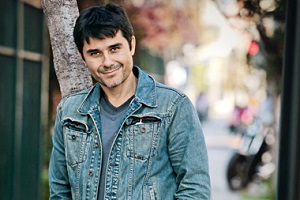
De Zweeds – Palestijnse dichter, toneelschrijver, journalist en literair criticus Ghayath Almadhoun werd geboren op 19 juli 1979 in Damascus. Zie ook alle tags voor Ghayath Almadhoun op dit blog.
How I became…
Her
grief fell from the balcony and broke into pieces, so she needed a new
grief. When I went with her to the market the prices were unreal, so I
advised her to buy a used grief. We found one in excellent condition
although it was a bit big. As the vendor told us, it belonged to a young
poet who had killed himself the previous summer. She liked this grief
so we decided to take it. We argued with the vendor over the price and
he said he’d give us an angst dating from the sixties as a free gift if
we bought the grief. We agreed, and I was happy with this unexpected
angst. She sensed this and said ‘It’s yours’. I took it and put it in my
bag and we went off. In the evening I remembered it and took it out of
the bag and examined it closely. It was high quality and in excellent
condition despite half a century of use. The vendor must have been
unaware of its value otherwise he wouldn’t have given it to us in
exchange for buying a young poet’s low quality grief. The thing that
pleased me most about it was that it was existentialist angst,
meticulously crafted and containing details of extraordinary subtlety
and beauty. It must have belonged to an intellectual with encyclopedic
knowledge or a former prisoner. I began to use it and insomnia became my
constant companion. I became an enthusiastic supporter of peace
negotiations and stopped visiting relatives. There were increasing
numbers of memoirs in my bookshelves and I no longer voiced my opinion,
except on rare occasions. Human beings became more precious to me than
nations and I began to feel a general ennui, but what I noticed most was
that I had become a poet.
Vertaald door Catherine Cobham
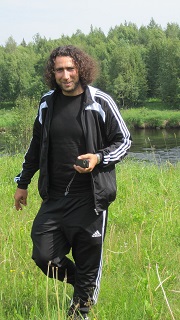
De Franse schrijver en filosoof Jean-Pierre Faye werd geboren in Parijs op 19 juli 1925. Zie ook alle tags voor Jean-Pierre Faye op dit blog.
Droit de suite
I
Où monte la crête de montagne
au-dessus des pentes, par
delà l’intervalle
la cassure pleine de son
drainant les échos
vers le soir de fumier et d’insectes et l’odeur de minerai
l’arête de parpaing effritée ou la longue mâchoire de poils
la chaleur lente d’animal le rouge rouillé de la plante
à ce point de soir et de terre, où
convergent les aines et les jambes
où se mêlent sens et son
le goût de fadeur et de fibre
les tiges à hauteur de ventre
le plomb du jour le ton de l’écoute
le gris des mains la mollesse des veines
le sang tombé dans le fond du poignet
la peau fermée et l’impasse des mains
la voix réunie la fonction de fer
le battement de l’artère saignée
le chaud d’aisselle le sel de l’étain
le métal vénéneux à ciel ouvert
la jambe ouverte l’eau de la langue
où ceci est noué et séparé
attaché et tiré
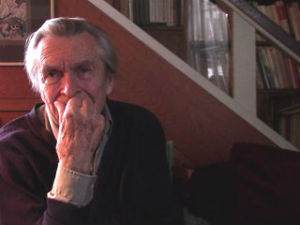
De Zuidafrikaanse dichter Lucas Cornelis Malan werd geboren in Nylstroom op 19 juli 1946. Zie ook alle tags voor Lucas Malan op dit blog
Selfportret
Rembrandt van Rijn het hierdie genre vervolmaak.
Hy van die Jodenbreestraat wat só vaardig, keer
op keer vleiende protrette van die rykes kon maak,
het tegelyk sy slag daarmee op homself gekeer.
Soveel keer so het hy dit weergegee: die trotse figuur
van ‘n jonkheer wat swierig geklee staan en pronk;
sy mooi gelaat hooghartig voor dié wat hom begluur
in sy glansende verfgewaad. Skilderagtig jonk.
Vat nou enige van daardie veeltal as eksemplaar
en gaan kyk hoe dit met die laaste twee vergelyk:
Dié gee ons ‘n droewe ou man wat na aan trane lyk.
Daar is niks. Net verdigte verdriet wat na buite staar.
Kyk nou die eie albums deur. Let op die gesig, die lyf.
Hoe meesterlik word jý in die Rembrandt-styl herskryf.
Self-portait
This genre was perfected by Rembrandt van Rijn
of Jodenbree Street who so deftly drew
flattering portraits on canvas time and again,
firstly of the wealthy, then his own likeness too.
He painted so often that proud figure there
of a preening nobleman, clothes richly hung
on his haughty frame, eyes holding all who stare
at his lustrously rendered attire. Picturesquely young.
Now, as an example, take the final two,
comparing them with any one of those:
There find a pitiful old man so close
to tears. Just concentrated sorrow confronting you.
Page through your own albums now. Note the face and profile.
How masterfully you are recreated in the Rembrandt style.
Vertaald door Charl J.F. Cilliers & Lucas Malan
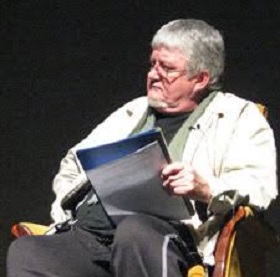
De Indiase dichter en schrijver Dominic Francis Moraes werd geboren op 19 juli 1938 in Bandra. Zie ook alle tags voor Dom Moreas op dit blog.
A Room by the Sea
Will, like the fingers of an empty glove.
A table weighed with silence like a parting.
The sea outside. And a shoe filled with nothing,
Looking for a foot that took its leave.
A fortress of restraint moved by two feet.
Almost books. And a glass without a use.
A bit of old air: two years, perhaps, since it
Refused to go out, and stayed here for always.
And suddenly a seawind feels me
As women feel the cloth in a store;
Is he good, will he wash well in the laundry?
Later I wove a flag of doubt once more.
I hung it up, and looked outside to find
How it clatters, moving in the wind.
Architecture
The architecture of an aunt
Made the child dream of cupolas,
Domes, other smoothly rounded shapes.
Geometries troubled his sleep.
The architecture of young women
Mildly obsessed the young man:
Its globosity, firmness, texture,
Lace cobwebs for adornment and support.
Miles from his aunt, the old child
Watched domes and cupolas defaced
In a hundred countries, as time passed.
A thousand kilometres of lace defiled,
And much gleaming and perfect architecture
Flaming in the fields with no visible support.
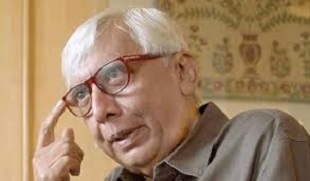
De Zwitserse schrijver Gottfried Keller werd geboren in Zürich op 19 juli 1819. Zie ook alle tags voor Gottfried Keller op dit blog.
Wandl ich in dem Morgentau
Durch die dufterfüllte Au,
Muß ich schämen mich so sehr
Vor den Blümlein ringsumher!
Täublein auf dem Kirchendach,
Fischlein in dem Mühlenbach
Und das Schlänglein still im Kraut,
Alles fühlt und nennt sich Braut.
Apfelblüt im lichten Schein
Dünkt sich stolz ein Mütterlein;
Freudig stirbt so früh im Jahr
Schon das Papillonenpaar.
Gott, was hab ich denn getan,
Daß ich ohne Lenzgespan,
Ohne einen süßen Kuß
Ungeliebet sterben muß?
Nachtfalter
Ermattet von des Tages Not und Pein,
Die nur auf Wiedersehen von mir schied,
Sass ich und schrieb bei einer Kerze Schein,
Und schrieb ein wild und gottverleugnend Lied.
Doch draussen lag die klare Sommernacht,
Mild grüsst mein armes Licht der Mondenstrahl,
Und aller Sterne volle goldne Pracht
Schaut hoch herab auf mich vom blauen Saal.
Am offnen Fenster blühen dunkle Nelken
Vielleicht die letzte Nacht vor ihrem Welken.
Und wie ich schreib’ an meinem Höllenpsalter,
Die süsse Nacht im Zorne von mir weisend,
Da schwebt herein zu mir ein grauer Falter,
Mit blinder Hast der Kerze Docht umkreisend;
Wohl wie sein Schicksal flackerte das Licht,
Dann züngelt’ seine Flamme still empor
Und zog wie mit magnetischem Gewicht
Den leichten Vogel in sein Todestor.
Ich schaute lang und in beklommner Ruh,
Mit wunderlich neugierigen Gedanken
Des Falters unheilvollem Treiben zu.
Doch als zu nah der Flamme schon fast sanken
Die Flügel, fasst’ ich ihn mit schneller Hand,
Zu seiner Rettung innerlich gezwungen,
Und trug ihn weg. Hinaus ins dunkle Land
Hat er auf raschem Fittig sich geschwungen.
Ich aber hemmte meines Liedes Lauf
Und hob den Anfang bis auf weitres auf.
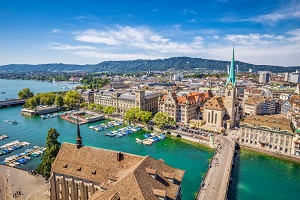
Zürich
Zie voor nog meer schrijvers van de 19e juli ook mijn blog van 19 juli 2018 en mijn blog van 19 juli 2017 en ook mijn blog van 19 juli 2015 deel 1 en eveneens deel 2.

